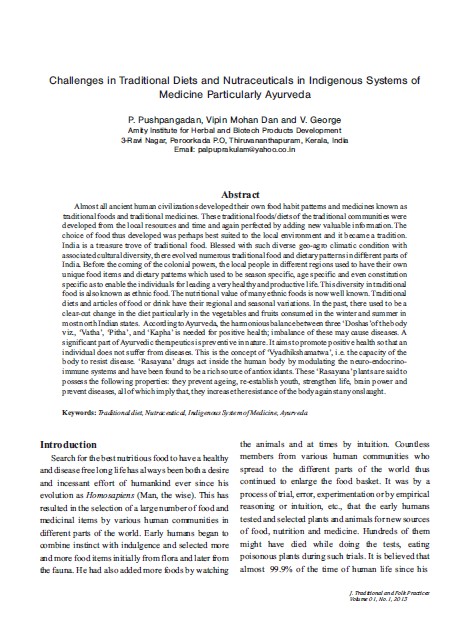Challenges in Traditional Diets and Nutraceuticals in Indigenous Systems of Medicine Particularly Ayurveda
Keywords:
Traditional diet, Nutraceutical, Indigenous System of Medicine, AyurvedaAbstract
Almost all ancient human civilizations developed their own food habit patterns and medicines known as traditional foods and traditional medicines. These traditional foods/diets of the traditional communities were developed from the local resources and time and again perfected by adding new valuable information. The choice of food thus developed was perhaps best suited to the local environment and it became a tradition. India is a treasure trove of traditional food. Blessed with such diverse geo-agro climatic condition with associated cultural diversity, there evolved numerous traditional food and dietary patterns in different parts of India. Before the coming of the colonial powers, the local people in different regions used to have their own unique food items and dietary patterns which used to be season specific, age specific and even constitution specific as to enable the individuals for leading a very healthy and productive life. This diversity in traditional food is also known as ethnic food. The nutritional value of many ethnic foods is now well known. Traditional diets and articles of food or drink have their regional and seasonal variations. In the past, there used to be a clear-cut change in the diet particularly in the vegetables and fruits consumed in the winter and summer in most north Indian states. According to Ayurveda, the harmonious balance between three ‘Doshas’of the body viz., ‘Vatha’, ‘Pitha’, and ‘Kapha’ is needed for positive health; imbalance of these may cause diseases. A significant part of Ayurvedic therapeutics is preventive in nature. It aims to promote positive health so that an individual does not suffer from diseases. This is the concept of ‘Vyadhikshamatwa’, i.e. the capacity of the body to resist disease. ‘Rasayana’ drugs act inside the human body by modulating the neuro-endocrinoimmune systems and have been found to be a rich source of antioxidants. These ‘Rasayana’ plants are said to possess the following properties: they prevent ageing, re-establish youth, strengthen life, brain power and prevent diseases, all of which imply that, they increase the resistance of the body against any onslaught.


